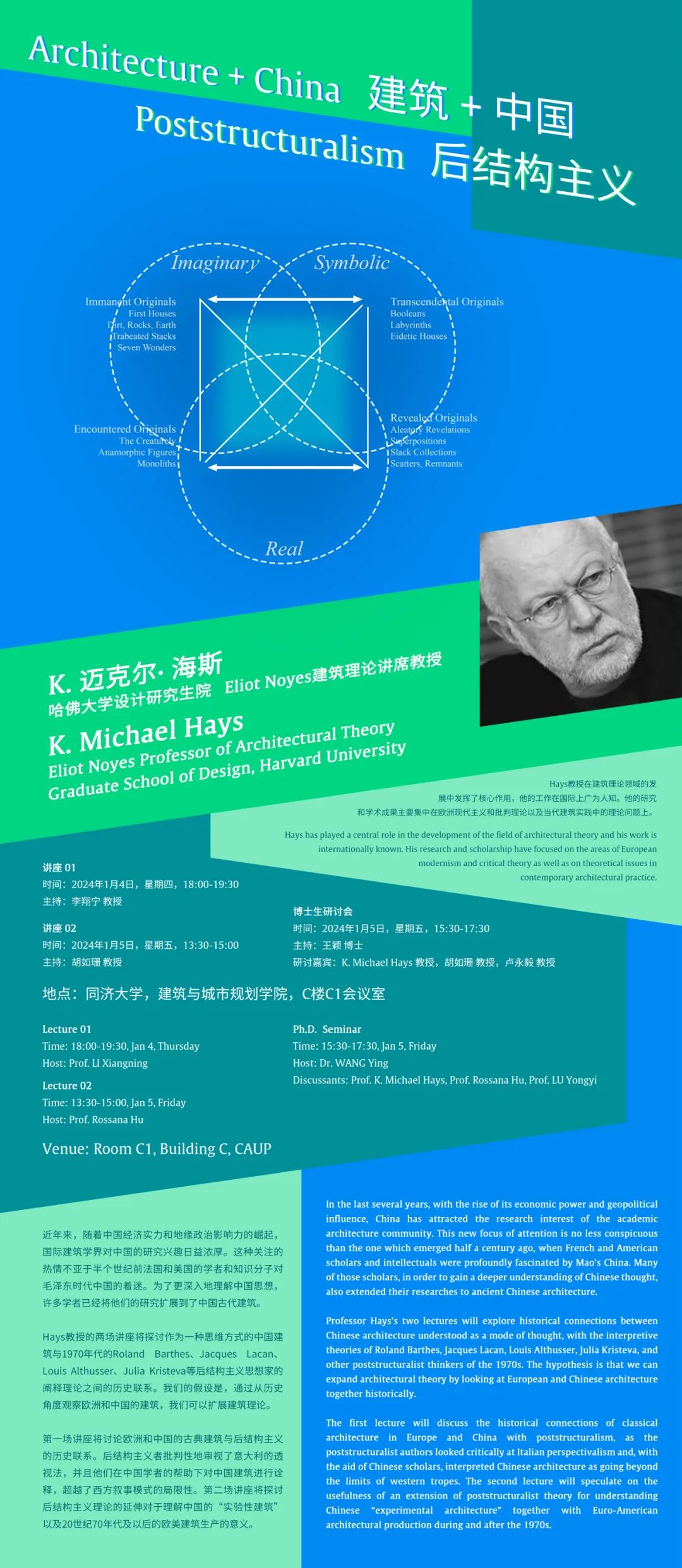

K. Michael Hays is Eliot Noyes Professor of Architectural Theory at the Harvard University Graduate School of Design. Hays has played a central role in the development of the field of architectural theory and his work is internationally known. His research and scholarship have focused on the areas of European modernism and critical theory as well as on theoretical issues in contemporary architectural practice. He has published on the work of modern architects such as Hannes Meyer, Ludwig Hilberseimer, and Mies van der Rohe, as well as on contemporary figures such as Peter Eisenman, Bernard Tschumi, and the late John Hejduk. Hays was the founder of the scholarly journal Assemblage, which was a leading forum of discussion of architectural theory in North America and Europe.
Lectures: (Architecture + China) / Poststructuralism
Lecture 01
Time: 18:00-19:30, Jan 4, Thursday Host: Prof. LI Xiangning
Lecture 02
Time: 13:30-15:00, Jan 5, Friday Host: Prof. Rossana Hu
Venue: Room C1, Building C, CAUP
Lectures Abstract:
In the last several years, with the rise of its economic power and geopolitical influence, China has attracted the research interest of the academic architecture community. This new focus of attention is no less conspicuous than the one which emerged half a century ago, when French and American scholars and intellectuals were profoundly fascinated by Mao’s China. Many of those scholars, in order to gain a deeper understanding of Chinese thought, also extended their researches to ancient Chinese architecture.
Professor Hays’s two lectures will explore historical connections between Chinese architecture understood as a mode of thought, with the interpretive theories of Roland Barthes, Jacques Lacan, Louis Althusser, Julia Kristeva, and other poststructuralist thinkers of the 1970s. The hypothesis is that we can expand architectural theory by looking at European and Chinese architecture together historically.
The first lecture will discuss the historical connections of classical architecture in Europe and China with poststructuralism, as the poststructuralist authors looked critically at Italian perspectivalism and, with the aid of Chinese scholars, interpreted Chinese architecture as going beyond the limits of western tropes. The second lecture will speculate on the usefulness of an extension of poststructuralist theory for understanding Chinese “experimental architecture” together with Euro-American architectural production during and after the 1970s.
Ph.D. Seminar
Time: 15:30-17:30, Jan 5, Friday Host: Dr. WANG Ying Discussants: Prof. K. Michael Hays, Prof. Rossana Hu, Prof. LU Yongyi Venue: Room C1, Building C, CAUP
Presentations
ZHANG Tian
Craftsmen, Knowledge, and Technology: Transformations of the Building Industry in Modern Shanghai (1843-1949)
WANG Yulin
“Picture-books” in Historiographies of Modern Architecture: The Production and Reproduction of Images, from Siegfried Giedion to the Tongji University Textbooks (1950-1980)
LU Bin
Case Studies of Industrial Architecture in China (1952-2002): Norms, Practices, and Technologies
QIU Jiayue
Designerly Ways of Knowing in Chinese Experimental Architecture: A Comparative Analysis of Writings, Drawings, and Designs
 ABOUT US
ABOUT US




